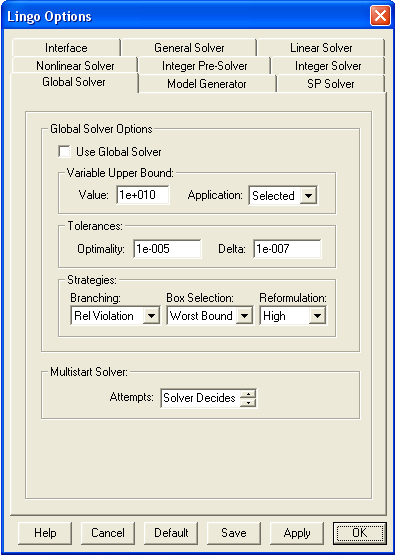Global Solver Tab |
The Global Solver tab on the Options dialog box:

is used to control the operation of LINGO's global solver capabilities. Please keep in mind that the global solver toolkit is an add-on option to LINGO. You must specifically purchase the global solver option as part of your LINGO license in order to make use of its capabilities.
LINGO exploits the convex nature of linear models to find globally optimal solutions. However, we aren’t as fortunate with nonlinear models. LINGO’s default NLP solver uses a local search procedure. This can lead to LINGO stopping at locally optimal points when a model is non-convex, perhaps missing a global point lying elsewhere. You may refer to On Mathematical Modeling for more information on how and why this can happen. The global solver toolkit contains features designed to sift through the local points in search of the globally optimal point.
The two primary features in LINGO’s global toolkit are a global solver and a multistart solver. The global solver uses range bounding and reduction techniques within a branch-and-bound framework to convert a non-convex model into a series of smaller, convex models. This divide-and-conquer strategy ultimately results in convergence to the guaranteed globally optimal point. The multistart solver, on the other hand, uses a heuristic approach of restarting the NLP solver several times from different initial points. It is not uncommon for a different starting point to lead to a different local solution point. Thus, if we restart from enough unique points, saving the best local solution as we go, then we stand a much better chance of finding the true global solution.
